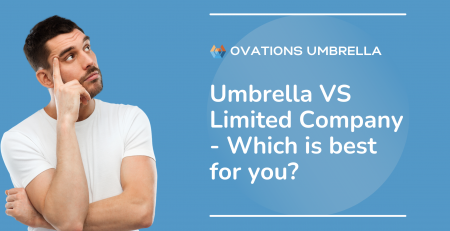Do Contractors pay Employer’s National Insurance (NIC)?

Why do I have to pay Employer’s National Insurance Contribution (ENIC)? is the most frequently asked question by almost all contractors and here is an answer to your query.
Before moving forward some important things to keep in mind:
- You become an employee of the Umbrella company you choose: By undertaking a contract through a PAYE (Pay As You Earn) Umbrella Company, you become its employee and umbrella becomes your employer.
- Employers have to pay Employers’ National Insurance Contributions by law: Employers National Insurance is paid by employer on the salaries paid to their employees by law. An additional 0.5% Apprenticeship Levy also needs to be paid by the employer, but as Umbrella company is not your actual employer this money will be paid by the Client you are working for and is included in your rate.
Difference between Contractors and Permanent employees
There are two scenarios how one can be employed
- As a Permanent employee: In this case the end client become your employer and is liable to pay the National Insurance Contribution taxes.
- As a Contractor: Sometimes due to the temporary nature of the task the client do not permanently hire an employees but hire them as a contractors and in this scenario an Umbrella Company acts as an intermediary. You sign up with the Umbrella Company and become their employee and provide services to the end client. In this relationship, the umbrella company is your employer and is liable to pay all the employment taxes and NI to HRMC, for this service they charge their umbrella margin/fee.
So who exactly pays the Employers’ National Insurance Contribution?
Few terms you should know before going ahead:
Cost of Employment /Employment costs refer to Employer’s National Insurance contributions and apprentice levy which is calculated at 14.3% (after allowances).
Contractors are not liable to pay the cost of employment from their wages, this is paid by the client and thus added to your agreed final rate with client which is called Assignment rate.
Assignment Rate is the contract rate you agree with the End client at the beginning of the contract which includes the Umbrella Company’s margin and the cost of employment (mentioned above). Thus it becomes important to factor in all these costs before confirming the final contract rate with the client.
So who exactly pays for the EMPLOYEES’ NATIONAL INSURANCE CONTRIBUTION ??
The answer is >>>>>> THE CLIENT and is included in your agreed final rate with the client.
Deductions made by all Compliant Umbrella Companies and showcased in your payslip.
- Employees’National Insurance Contribution
- Employer’s National Insurance Contribution
- Umbrella Company’s margins
- Apprenticeship Levy (after a certain period of time)
- Holiday Pay (If applicable)
- Pension Contribution (if applicable)
As per FCSA’s chief executive, Julia Kermode :
“All employers must pay employers national insurance, and it is illegal to deduct this from a worker’s
income. That is one reason why compliant umbrella firms always ensure that their employees
understand the difference between the assignment rate and their gross pay.”
“The assignment rate includes employment costs such as employers’ national insurance, holiday pay,
apprenticeship levy, and pensions contributions. Such costs should always be factored into the
assignment rate because, as employers, umbrellas are legally obliged to pay them.”It is strongly recommended to use compliant and trusted umbrella company to avoid illegal
employment tax deductions from workers’ gross pay.
How much national insurance is payable on my rate in 2020/21?
Employees’ Class 1 NI is charged at 12% of your gross taxable pay from £183 – £962 per week
(£9,500 – £50,000 per year), and 2% above this amount.
Employers’ Class 1 NI is charged at 13.8% on earnings above £169 per week (£8,778 per year).
Refer the following link for complete list: https://www.gov.uk/national-insurance-rates-letters
How are employment costs displayed on my umbrella payslip?
Your agency/client will pay your umbrella company for your last period’s earnings which will be a
multiple of your assignment rate (defined above)
The employment costs (employers’ NIC and apprenticeship levy) are then deducted from this income
along with pension contributions (if any) and holiday pay. This result leaves you with the gross pay
upon which you will pay income tax.
As an employee, you will pay employees’ NIC and income tax on your gross pay. The umbrella
company will deduct this and give you your net pay.
Hope this helps 🙂
You may contact us if you require more further information on this from the Contact Us section. Cheers!





Leave a Reply
You must be logged in to post a comment.